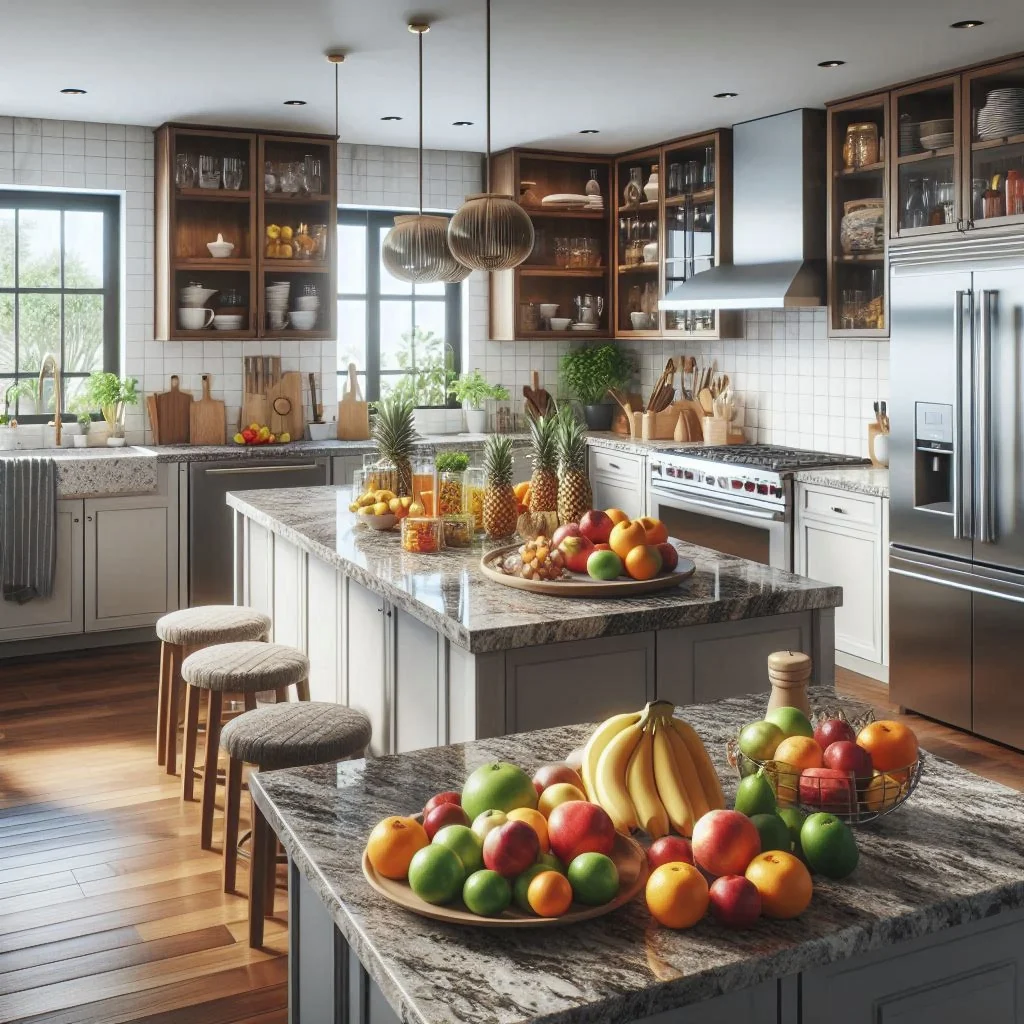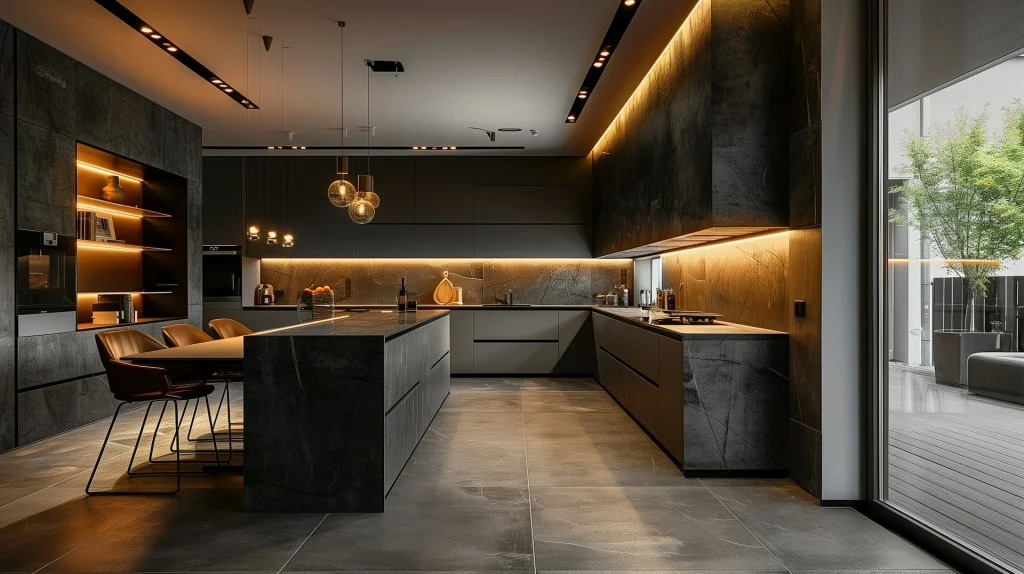Embarking on a kitchen remodeling project is an exciting yet daunting endeavor. As the heart of your home, your kitchen deserves nothing but the best in terms of design, functionality, and craftsmanship. However, turning your dream kitchen into reality requires more than just a vision—it demands the expertise of skilled professionals who can bring your ideas to life while navigating the complexities of construction, design, and project management.
Selecting the right kitchen remodeling professionals is a critical decision that can make or break your project. The ideal team will not only possess the technical skills and experience necessary to execute your vision but also understand your unique needs, preferences, and budget constraints. They should be able to guide you through the entire process, from initial concept to final installation, ensuring that every detail is perfect and that the end result exceeds your expectations.
In this comprehensive guide, we’ll walk you through the essential steps and considerations for choosing the best kitchen remodeling professionals for your project. We’ll explore key factors such as credentials, experience, communication skills, and project management capabilities. By the end of this article, you’ll be equipped with the knowledge and tools needed to make an informed decision and set your kitchen renovation up for success.
Whether you’re planning a minor update or a complete overhaul, the journey to your dream kitchen begins with assembling the right team. Let’s dive in and discover how to find the perfect partners for your kitchen remodeling adventure.








Preparing to Choose Professionals
Before you start reaching out to kitchen remodeling professionals, it’s crucial to assess your own needs and preferences. This preparation will help you communicate effectively with potential contractors and ensure you choose the right team for your project. Here are the key aspects to consider:
Evaluating Your Needs
Determining the Scope of Work
First, decide whether you’re looking for a cosmetic update or a full-scale renovation. This decision will significantly impact the professionals you’ll need to hire and the overall project timeline.
- Cosmetic updates might include:
- Painting cabinets
- Replacing hardware
- Updating light fixtures
- Installing new countertops
- Major renovations could involve:
- Changing the kitchen layout
- Moving plumbing or electrical systems
- Installing new appliances
- Replacing flooring
Establishing Your Budget
Determine how much you’re willing to invest in your kitchen remodel. Be realistic about costs and include a buffer for unexpected expenses. Consider:
- The value of your home
- How long you plan to stay in your current residence
- Your financial situation and financing options
Having a clear budget will help you narrow down your choices for both materials and professionals.
Identifying Design Preferences and Material Choices
Before meeting with professionals, gather ideas about your desired kitchen style and the materials you prefer. This preparation will make your conversations with designers and contractors more productive.
- Create a mood board or Pinterest collection of kitchens you admire
- List must-have features and nice-to-have elements
- Research different materials for countertops, cabinets, and flooring
- Consider the longevity and maintenance requirements of various options
By thoroughly assessing your needs, budget, and preferences, you’ll be better equipped to choose the right kitchen remodeling professionals who can bring your vision to life while respecting your financial constraints.
Where to Find Professionals
When embarking on a kitchen remodeling project, finding the right professionals is crucial to ensure a successful outcome. Here are some effective ways to locate qualified kitchen remodeling experts:
Recommendations from Friends and Family
One of the most reliable methods to find trustworthy professionals is through personal recommendations. Here’s why:
- Built-in Trust: Referrals from people you know come with a level of trust that’s hard to establish otherwise.
- First-hand Experience: Friends and family can provide detailed insights about their experience working with the professionals.
- Opportunity for Honest Feedback: You can ask candid questions about the quality of work, communication, and overall satisfaction.
However, remember that personal tastes and project scopes can vary, so always do your own due diligence even with personal recommendations.
Online Platforms and Review Sites
The digital age has made it easier than ever to find and vet professionals. Popular platforms include:
- Houzz: A platform specifically designed for home improvement, offering portfolios, reviews, and direct communication with professionals.
- Angi (formerly Angie’s List): Provides detailed reviews and ratings for local service providers.
- HomeAdvisor: Offers a network of screened and approved contractors.
Pros of using these platforms:
- Wide selection of professionals
- Access to customer reviews and ratings
- Often include photos of completed projects
Cons to consider:
- Some reviews may be biased or fake
- Top-listed professionals may be paying for placement
- Overwhelming number of options
When using these platforms, pay attention to:
- Consistency in reviews
- How professionals respond to negative feedback
- The recency and relevance of completed projects
Social Media and Specialized Forums
Social media platforms and industry-specific forums can be valuable resources for finding kitchen remodeling professionals:
Social Media
- Instagram: Many professionals showcase their work here. Look for consistent posting of high-quality project photos.
- Facebook: Local community groups often have discussions and recommendations about home improvement professionals.
- Pinterest: While primarily for inspiration, many pins link back to professional remodelers’ websites.
Specialized Forums
- Houzz Forums: Engage in discussions with both homeowners and professionals.
- Reddit: Subreddits like r/HomeImprovement can offer advice and recommendations.
When using these platforms:
- Look for professionals who actively engage with their audience
- Pay attention to the quality of their interactions and advice
- Be cautious of overly promotional content
Remember, while these methods can help you find potential professionals, it’s essential to thoroughly vet any candidates. Always check credentials, ask for references, and ensure they are properly licensed and insured before making your final decision.
How to Assess Professionalism and Qualifications
When selecting kitchen remodeling professionals, it’s crucial to evaluate their expertise and qualifications thoroughly. This chapter will guide you through the key aspects to consider when assessing potential contractors.
Portfolio of Work
A contractor’s portfolio is a window into their capabilities and style. Here’s what to look for in a strong portfolio:
- Diversity of Projects: Look for a range of kitchen styles and sizes, demonstrating versatility.
- Before and After Photos: These provide a clear picture of the transformation and attention to detail.
- Quality of Finishes: Pay attention to the craftsmanship in cabinetry, countertops, and overall design.
- Consistency: A professional portfolio should show consistently high-quality work across multiple projects.
- Recent Projects: Ensure the portfolio includes recent work to reflect current trends and skills.
Client Recommendations and Reviews
Reviews and recommendations offer insights into a contractor’s reliability and customer satisfaction. Here’s how to verify their authenticity:
- Multiple Sources: Check reviews across various platforms (e.g., Google, Yelp, Houzz) for consistency.
- Detailed Feedback: Look for specific comments about the work quality, communication, and timeline adherence.
- Follow Up: Don’t hesitate to ask the contractor for references and contact previous clients directly.
- Red Flags: Be wary of an abundance of overly positive reviews with similar writing styles or posted within a short time frame.
Licenses and Certifications
Proper documentation is crucial for ensuring you’re working with legitimate professionals:
- State Licenses: Verify that the contractor holds the required state licenses for kitchen remodeling.
- Insurance: Confirm they have general liability insurance and workers’ compensation coverage.
- Bonding: Check if the contractor is bonded, which provides additional financial protection.
- Professional Certifications: Look for certifications from recognized industry organizations like NARI (National Association of the Remodeling Industry) or NKBA (National Kitchen and Bath Association).
Personal Interaction
The initial meeting with a potential contractor can reveal much about their professionalism. Consider asking these questions:
- Experience: “How long have you been specializing in kitchen remodeling?”
- Project Timeline: “What’s your typical timeline for a project of this scope, and how do you handle unexpected delays?”
- Subcontractors: “Do you use subcontractors, and if so, how do you ensure their quality of work?”
- Permits: “Will you handle all necessary permits, and are you familiar with local building codes?”
- Warranty: “What kind of warranty do you offer on your work, and what does it cover?”
- Communication: “How often will we communicate during the project, and what’s your preferred method?”
- Problem-Solving: “Can you give an example of a challenging kitchen remodel you’ve completed and how you overcame the obstacles?”
By thoroughly evaluating these aspects, you’ll be better equipped to choose a kitchen remodeling professional who can deliver the quality and reliability you deserve for your project.
Important Selection Criteria
When embarking on a kitchen remodeling project, selecting the right professionals is crucial for ensuring a successful outcome. Here are key criteria to consider:
Experience and Specialization
Choosing professionals with specific experience in kitchen remodeling is paramount. While general contractors may offer their services, specialists in kitchen renovations bring unique insights and skills to the table:
- Deep understanding of kitchen layouts: They know how to optimize space for both functionality and aesthetics.
- Familiarity with kitchen-specific systems: This includes plumbing, electrical, and ventilation requirements unique to kitchens.
- Knowledge of current trends and materials: They can advise on durable, kitchen-appropriate materials and cutting-edge design trends.
- Problem-solving skills: Experienced kitchen remodelers have likely encountered and solved various issues specific to kitchen renovations.
Look for professionals who can showcase a portfolio of successful kitchen projects and provide references from satisfied clients.
Team vs. Solo Practitioner
Deciding between a team of professionals or a solo contractor depends on your project’s scope and personal preferences:
Team Advantages:
- Diverse skill sets under one roof
- Potentially faster project completion
- Built-in backup if one member is unavailable
Solo Practitioner Advantages:
- Often more personalized attention
- Potentially lower costs
- Direct communication with the person doing the work
Consider the complexity of your project and your preferred communication style when making this choice.
Cost of Services
Evaluating the cost of kitchen remodeling services requires a nuanced approach:
- Get multiple quotes: Aim for at least three estimates to gauge the market rate.
- Beware of outliers: Extremely low bids may indicate cut corners or hidden costs, while very high bids should be thoroughly justified.
- Understand the pricing structure: Flat fee vs. time and materials can affect your final cost.
- Look beyond the bottom line: Consider value-added services, quality of materials, and the professional’s reputation.
- Request detailed breakdowns: This helps you understand where your money is going and compare quotes effectively.
Remember, the cheapest option isn’t always the most cost-effective in the long run. Quality work and materials can save money on future repairs and maintenance.
Project Timeline
Realistic timelines are crucial for a smooth renovation process:
- Ask for a detailed project schedule: This should include start and end dates for each phase of the remodel.
- Understand factors that could cause delays: Weather, material availability, and unforeseen structural issues can all impact timelines.
- Discuss how delays are handled: Understand the communication process for timeline changes and any associated costs.
- Check their track record: Ask previous clients about the professional’s ability to stick to proposed timelines.
- Build in buffer time: Experienced professionals often add a bit of extra time to account for unexpected issues.
A contractor who promises an unrealistically short timeline may be cutting corners or overcommitting their resources. Conversely, excessively long timelines might indicate inefficiency or overbooking.
By carefully considering these criteria – experience and specialization, team structure, cost, and timeline – you’ll be well-equipped to choose kitchen remodeling professionals who can turn your vision into reality efficiently and effectively.
Signing the Contract
Once you’ve selected a kitchen remodeling professional, the next crucial step is signing a contract. A well-drafted agreement protects both parties and ensures a smooth renovation process. Here’s what you need to know:
Essential Contract Components
A comprehensive kitchen remodeling contract should include:
- Project Scope: Detailed description of the work to be performed.
- Timeline: Start and estimated completion dates, including milestones.
- Cost Breakdown: Itemized list of expenses, including materials and labor.
- Payment Schedule: Clear outline of payment amounts and due dates.
- Materials Specifications: Brands, models, and quantities of all materials to be used.
- Change Order Process: Procedure for requesting and approving changes to the original plan.
- Warranties and Guarantees: Details on workmanship and materials warranties.
- Permits and Inspections: Responsibility for obtaining necessary permits and scheduling inspections.
Rights and Responsibilities
To protect yourself from unforeseen circumstances:
- Contractor’s Obligations: Clearly state the contractor’s responsibilities, including cleanup, debris removal, and protection of your property.
- Homeowner’s Responsibilities: Outline your obligations, such as providing access to the work area and making timely decisions.
- Termination Clause: Include conditions under which either party can terminate the contract and the associated penalties.
- Dispute Resolution: Specify the process for resolving disagreements, such as mediation or arbitration.
Payment Terms
A typical payment structure for kitchen remodeling projects includes:
- Down Payment: Usually 10-30% of the total cost, paid upon signing the contract.
- Progress Payments: Tied to project milestones or specific dates, ensuring steady cash flow for the contractor.
- Final Payment: The remaining balance, typically 10-15%, paid upon satisfactory completion of the project.
Always tie payments to completed work rather than calendar dates. This incentivizes the contractor to stay on schedule and protects you from paying for unfinished work.
Remember, never pay the full amount upfront, and consider using an escrow service for large projects to add an extra layer of financial security.
By carefully reviewing and understanding all aspects of the contract before signing, you set the foundation for a successful kitchen remodeling project and a positive working relationship with your chosen professionals.
Controlling the Kitchen Remodeling Process
Once you’ve chosen the right professionals for your kitchen remodeling project, it’s crucial to stay involved and maintain control throughout the process. This chapter will guide you through effective strategies for overseeing your kitchen renovation.
Regular Inspections: Frequency and Focus
Regular inspections are vital to ensure your kitchen remodeling project stays on track. Here’s what you need to know:
Frequency
- Daily walk-throughs: Brief visual inspections at the end of each workday.
- Weekly detailed inspections: In-depth examinations of the work completed.
- Milestone checks: Thorough inspections at key project stages (e.g., after demolition, rough-in, and before finishes).
What to Check
- Quality of workmanship
- Adherence to the agreed-upon design
- Materials used (brand, quality, quantity)
- Progress compared to the timeline
- Cleanliness and safety of the work area
Pro Tip: Keep a log of your observations and any concerns that arise during inspections.
Effective Communication with Your Remodeling Team
Clear, consistent communication is key to a successful kitchen remodel. Here’s how to maintain an effective dialogue:
- Designate a primary point of contact (usually the project manager).
- Establish a regular meeting schedule (e.g., weekly check-ins).
- Use a shared communication platform (e.g., project management software or group messaging app).
- Be clear and specific when discussing concerns or changes.
- Document all significant conversations and decisions in writing.
Remember: Good communication is a two-way street. Be open to listening to your team’s professional advice and concerns as well.
Resolving Conflicts: Strategies and Tips
Despite the best planning, conflicts may arise during your kitchen remodel. Here are some strategies for resolution:
- Address issues promptly: Don’t let small problems escalate.
- Stay calm and professional: Emotional reactions rarely lead to productive solutions.
- Focus on facts and contract terms: Refer to your agreement when discussing discrepancies.
- Seek to understand: Listen to your contractor’s perspective before jumping to conclusions.
- Propose solutions: Be part of the problem-solving process.
- Document everything: Keep records of all discussions and agreements.
- Consider mediation: If you can’t reach an agreement, a neutral third party can help.
Pro Tip: Include a dispute resolution clause in your contract before work begins.
By implementing these strategies for regular inspections, effective communication, and conflict resolution, you’ll be well-equipped to control your kitchen remodeling process and achieve the results you desire.
Completion and Acceptance of Work
As your kitchen remodeling project nears its end, it’s crucial to ensure that all work meets your expectations and contractual agreements. This final phase involves a thorough inspection and understanding of the warranty terms. Here’s what you need to know:
Final Quality Inspection
Before signing off on the completed work, conduct a comprehensive inspection of your newly remodeled kitchen. Pay close attention to the following:
- Functionality: Test all appliances, faucets, and electrical outlets to ensure they work properly.
- Cabinetry: Check for smooth operation of drawers and doors, proper alignment, and quality of finishes.
- Countertops: Inspect for proper installation, sealing, and absence of chips or cracks.
- Flooring: Look for even installation, proper sealing, and matching patterns (if applicable).
- Paintwork: Examine walls and ceilings for smooth, even coverage and clean lines.
- Lighting: Verify that all fixtures are correctly installed and functioning.
- Plumbing: Check for leaks and proper water pressure in all sinks.
- Ventilation: Ensure that range hoods and exhaust fans are operating effectively.
Document any issues or concerns you find during this inspection. Communicate these to your contractor and ensure they are addressed before you sign the final acceptance document.
Warranty and After-Service
Understanding your warranty coverage is essential for long-term satisfaction with your kitchen remodel. Here’s what you should know:
- Warranty Coverage:
- Typically includes defects in materials and workmanship
- May vary for different components (e.g., longer warranties for cabinetry vs. labor)
- Usually doesn’t cover normal wear and tear or improper use
- Duration:
- General contractor’s warranty often lasts 1-2 years
- Manufacturer warranties on appliances and materials may extend longer
- What’s Usually Included:
- Structural issues
- Electrical and plumbing problems
- Defective materials or installation errors
- How to Use the Warranty:
- Keep all documentation, including the contract and warranty certificates
- Contact your contractor promptly if issues arise
- Follow proper maintenance guidelines to avoid voiding the warranty
- Regular Maintenance:
- Ask your contractor for care instructions for various elements of your new kitchen
- Follow these guidelines to maintain the quality and potentially extend the life of your remodel
Remember, a reputable contractor stands behind their work. They should be responsive to any concerns that arise during the warranty period and be willing to address issues promptly and professionally.
By thoroughly inspecting the completed work and understanding your warranty terms, you ensure that your kitchen remodeling project concludes satisfactorily and that you’re prepared for the years of enjoyment in your new kitchen ahead.








 Furniture manufacturing
Furniture manufacturing Furniture renovation
Furniture renovation Room decoration
Room decoration